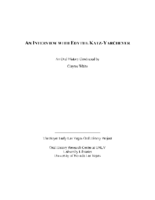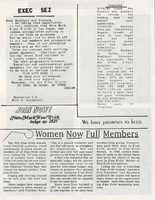Search the Special Collections and Archives Portal
Search Results
Audio clip 2 from interview with Ruth Urban, August 24, 2015 and September 16, 2015
Description
In this clip Ruth Urban discusses her time as the Jewish Family Services President.

Dr. Kathleen Kahn Mahon interview, December 3, 2018: transcript
Date
Archival Collection
Description
In 1980, Sunrise Hospital was looking to provide specialized services for pediatrics. They recruited a young pediatric ophthalmologist named Dr. Kathleen Melanie Kahn Mahon. Intrigued by the opportunity to relocate to Las Vegas, Dr. Mahon became one of the first female pediatric ophthalmologists in the city. Dr. Mahon is a highly accomplished pediatric ophthalmologist: Fellow of the American College of Surgeons, Fellow of the American Academy of Pediatrics, Fellow of the American Academy of Ophthalmology, Fellow of the American Academy of Quality Assurance and Utilization Review Medicine. Raised in Santa Fe, Dr. Mahon is the family historian and recalls parts of the family’s ancestral history through the generations. She speaks of her family’s Jewish immigration from Germany and Austria, and a deep historical legacy in New Mexico, which can be traced to the 1800s. As the Mahon family settled into southern Nevada, community involvement was a high priority for her. Among the local organizations that she devoted much of her time to were the Rotary Club, Ronald McDonald House, and Junior League. Dr. Mahon and her husband William were early members of Congregation Ner Tamid. She recalls both her and her son’s b’nai mitzvahs held at the synagogue. She includes anecdotes of enjoying Las Vegas -- stories that range from knowing respected banker Selma Bartlett to the famous Nat Hart from Caesars Palace.
Text

Transcript of interviews with Edythe Katz-Yarchever by Claytee White, 2000-2005
Date
Archival Collection
Description
Transcript of interviews with Edythe Katz-Yarchever by Claytee White over the course of several sessions in 2000, 2003 and 2005. In the interviews, Katz-Yarchever discusses her life in Las Vegas, owning theaters with her husband, Lloyd Katz, and the strides they made in civil rights. She talks about her service in Civil Defense and the National Guard, and moving to various places, then working in California and meeting her husband, Lloyd. The Katzes became involved in the community in various ways with Operation Independence and Holocaust education. About a decade after Lloyd's death, Edythe married Judge Gilbert Yarchever.
Edythe Katz-Yarvhever was born in Boston, a second generation American whose grandparents left Russia the century before. Edythe completed finishing school at the start of World War II and worked various jobs at home before joining the Civil Defense, and later, the National Guard. She moved to Maryland and got a job as a secretary at Edgewood Arsenal, then transferred to Cushing General Hospital to assist a Marine Corps neurologist, who was also a Jewish refugee. Towards the end of the war, she is transferred to an Army hospital in Hawaii, and thus began the rest of her life on the West Coast. When the war ended, Edythe sailed to California and worked various jobs in Los Angeles: in the secretarial pool at MGM Studios, for a casting agency and for a hotel magazine. Edythe met Lloyd Katz in San Francisco, and the two were married after a short courtship. The couple lived in San Francisco before moving to Las Vegas in 1951, where they took over the management of the Huntridge, Palace and Fremont theaters, then leased by Edythe's parents. The Katzes took a stand to desegregate their theaters, allowing black customers to sit with white patrons. Edythe and Lloyd became active in the city's Civil Rights Movement, including work with Operation Independence and the NAACP. Edythe started organizations like Volunteers for Education and Junior Art League, and directed an interfaith, interracial preschool. Lloyd would frequently open up their theaters to organizations to hold fundraisers, free-of-charge. Edythe was extremely active in the local Jewish community, including opening the city's first Jewish gift shop, serving as sisterhood president at her synagogue and starting the Jewish Reporter. She later founded a library for Holocaust education as well as assisted the school district's development of curriculum and teacher training relating to the Holocaust. Lloyd Katz passed away in 1986, and in 1995, Edythe married Gilbert Yarchever. Edythe and Lloyd's community service work was honored with the naming of their school, the Edythe and Lloyd Katz Elementary School, where Edythe still remains active.
Text
Laura Sussman oral history interview
Identifier
Abstract
Oral history interview with Laura Sussman conducted by Barbara Tabach on October 29, 2020 for The Great Pause: Las Vegas Chronicles of the COVID-19 Pandemic. Born and raised in Cleveland, Ohio, Laura moved to Las Vegas in 1990. She and her wife, Wendy Kraft, own the Kraft-Sussman funeral home in Las Vegas. Laura talks of her work as a funeral director and in the community as President of the Jewish Family Services Agency. She also discusses the impacts of COVID-19 she's witnessed on Las Vegas residents. Subjects discussed include: COVID-19 impacts; traveling during COVID-19; networking with other funeral homes; Jewish Family Services community support
Archival Collection
Dorothy Eisenberg oral history interview
Identifier
Abstract
Oral history interview with Dorothy Eisenberg conducted by Stefani Evans and Claytee D. White on March 08, 2017 for the Building Las Vegas Oral History Project. Eisenberg starts this interview by discussing her personal history and growing up in Philadelphia, Pennsylvania. She describes living through World War II, arriving to Las Vegas, Nevada in 1964, and the Jewish community that she was involved with at Temple Beth Sholom. Lastly, Eisenberg talks about being a founding member of the League of Women Voters in Las Vegas and racial integration in Clark County schools. Digital audio and transcript available.
Archival Collection
Miriam "Mimi" Katz Papers
Identifier
Abstract
The Miriam "Mimi" Katz Papers are mainly comprised of materials documenting Katz's involvement with community organizations in Las Vegas, Nevada from the 1940s to 2015 (the bulk of the materials date from 2002 to 2014). A large portion of the collection consists of planning documents, correspondence, event programs, newsletters, meeting agendas, meeting minutes, photographs, and other records related to Katz's involvement in the Brandeis National Committee Las Vegas Chapter and the Temple Beth Sholom Women's League. The collection also includes similar types of materials that document Katz's work with other community groups such as the Jewish Community Center of Southern Nevada and the League of Women Voters, and her work on the political campaigns of Democratic state and federal politicians.
Archival Collection
Wedding party for Lilia Nieto gathered outside Joan of Arc Catholic Church in Las Vegas, Nevada. Back row: 5 unidentified men; middle row: Lilia Nieto, unidentified groom, 3 unidentified women; First row: Paula Ozaki, Luis Nieto Jr., and unidentified individual (identified left to right): photograph, 1957 January 06
Level of Description
Archival Collection
Collection Name: Marta and Pedro Ortiz Family Papers
Box/Folder: Box 01
Archival Component

Nate Mack B'nai B'rith lodge no. 2825 Newsbeat newsletters, item 02
Description
Newsbeat newsletter (first page missing)
T-Shirt Color: Navy Blue; Front: Tri-Lakes Fire Rescue, Monument, CO, Fire Dept. Emblem; Back: Fire Rescue; Handwritten Text: To Our Brothers & Sisters Our Heart Felt Sympathy And Prayers Are With You. We Are Proud Of You From The Men & Women Of Tri-Lakes FPD, approximately 2001-2012
Level of Description
Archival Collection
Collection Name: New York-New York Hotel and Casino 9-11 Heroes Tribute Collection
Box/Folder: Box 90
Archival Component
T-Shirt Color: Gray; Front: Mystic Fire Department, Conn., Dept. Emblem; Back: Mystic Fire Dept.; Handwritten Text: In Remembrance Of Chief Frank Hilbert. 9-11-01 To All The Brave Men + Women Who Put There Lives On The Line Day In And Day Out You'll Always Be Remembered, approximately 2001-2012
Level of Description
Archival Collection
Collection Name: New York-New York Hotel and Casino 9-11 Heroes Tribute Collection
Box/Folder: Box 17
Archival Component
